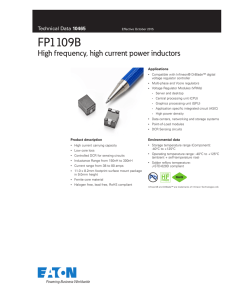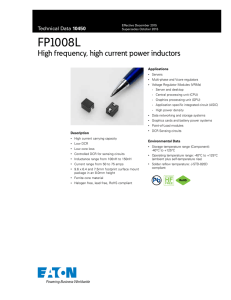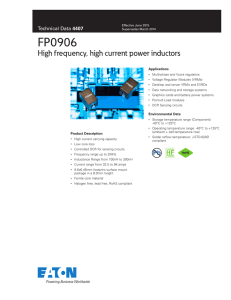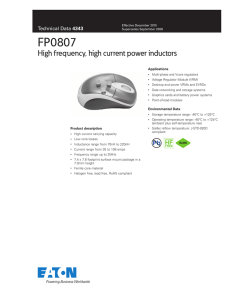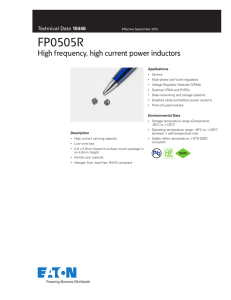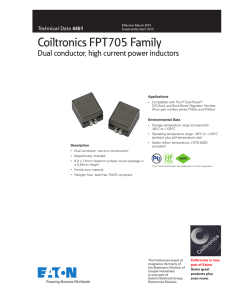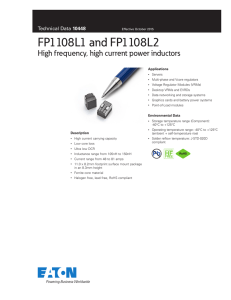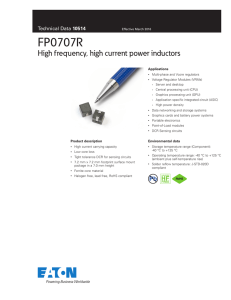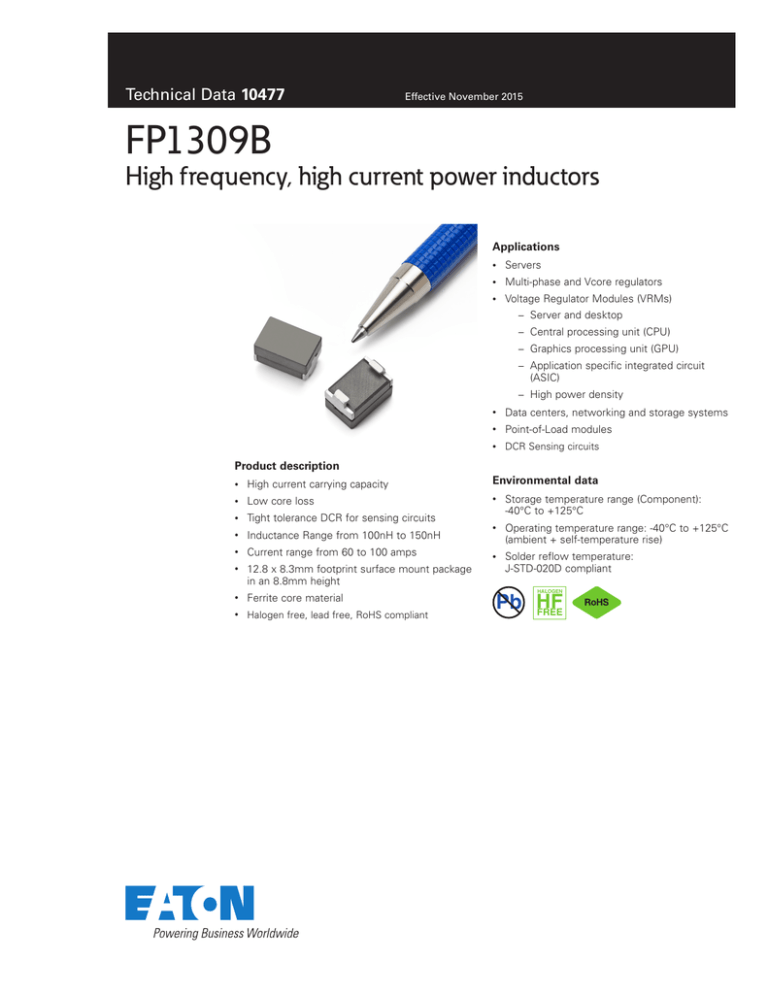
Technical Data 10477
Effective November 2015
FP1309B
High frequency, high current power inductors
Applications
•
Servers
•
Multi-phase and Vcore regulators
•
Voltage Regulator Modules (VRMs)
−− Server and desktop
−− Central processing unit (CPU)
−− Graphics processing unit (GPU)
−− Application specific integrated circuit
(ASIC)
−− High power density
•
Data centers, networking and storage systems
•
Point-of-Load modules
•
DCR Sensing circuits
Product description
•
High current carrying capacity
Environmental data
•
Low core loss
•
•
Tight tolerance DCR for sensing circuits
Storage temperature range (Component):
-40°C to +125°C
•
Inductance Range from 100nH to 150nH
•
•
Current range from 60 to 100 amps
Operating temperature range: -40°C to +125°C
(ambient + self-temperature rise)
•
•
12.8 x 8.3mm footprint surface mount package
in an 8.8mm height
Solder reflow temperature:
J-STD-020D compliant
•
Ferrite core material
•
Halogen free, lead free, RoHS compliant
HALOGEN
Pb HF
FREE
FP1309B
High frequency, high current power inductors
Technical Data 10477
Effective November 2015
Product specifications
OCL1
(nH)±10%
FLL2
(nH) minimum
Irms3
(amps)
Isat14
(amps)
Isat25
(amps)
DCR (mΩ)
±5% @ 20°C
K-factor6
FP1309B1-R100-R
100
72
60
100
80
0.19
296
FP1309B1-R120-R
120
87
60
90
72
0.19
296
FP1309B1-R150-R
150
108
60
80
64
0.19
296
Part Number7
B1 version
1. Open Circuit Inductance (OCL) Test Parameters: 100kHz, 0.1Vrms, 0.0Adc, +25°C
2. Full Load Inductance (FLL) Test Parameters: 100kHz, 0.1Vrms, Isat1, +25°C
3.Irms: DC current for an approximate temperature rise of 40°C without core loss. Derating is necessary
for AC currents. PCB layout, trace thickness and width, air-flow, and proximity of other heat generating components will affect the temperature rise. It is recommended that the temperature of the part
not exceed 125°C under worst case operating conditions verified in the end application.
4.Isat1: Peak current for approximately 20% rolloff @ +25°C
5.Isat2: Peak current for approximately 20% rolloff @ +125°C
6. K-factor: Used to determine Bp-p for core loss (see graph). Bp-p = K * L * ΔI * 10-3. Bp-p:(Gauss),
K: (K-factor from table), L: (Inductance in nH), ΔI (Peak to peak ripple current in Amps).
7. Part Number Definition: FP1309Bx-Rxxx-R
FP1309B= Product code and size
x= Version indicator
Rxxx= Inductance value in μH, R= decimal point
-R suffix = RoHS compliant
Dimensions (mm)
Recommended Pad Layout
Part marking: FP1309Bx (Product code and size, x = version indicator),
Rxxx = Inductance value in uH, R = decimal point
wwllyy = date code, R = revision level
All soldering surface to be coplanar within 0.10mm
DCR measured between point “a” and point “b”
2
www.eaton.com/elx
Schematic
FP1309B
High frequency, high current power inductors
Technical Data 10477
Effective November 2015
Packaging information (mm)
Supplied in tape and reel packaging, 330 parts per 13” diameter reel
User Direction of Feed
Temperature rise vs. total loss
FP1309B1
60
Temperature Rise (°C)
50
40
30
20
10
0
0.0
0.5
1.0
1.5
2.0
Total Loss (W)
www.eaton.com/elx
3
FP1309B
High frequency, high current power inductors
Technical Data 10477
Effective November 2015
Core loss vs. Bp-p
FP1309B1
10
1MHz
800kHz
1
Core Loss (W)
500kHz
300kHz
0.1
0.01
0.001
100
10000
1000
Bp-p (Gauss)
Inductance characteristics
FP1309B1-R100-R
120%
100%
-40°C
80%
60%
+25°C
40%
+125°C
20%
+100°C
0
20
40
60
80
100
120
140
160
FP1309B1-R150-R
120%
100%
80%
% of OCL
60%
40%
+125°C
+100°C
20%
I DC (Amps)
-40°C
60%
40%
+125°C
20%
0%
0
20
40
60
80
I DC (Amps)
4
-40°C
80%
% of OCL
% of OCL
100%
0%
FP1309B1-R120-R
120%
www.eaton.com/elx
+100°C
100
+25°C
120
140
0%
0
20
40
60
80
100
I DC (Amps)
+25°C
120
140
160
FP1309B
High frequency, high current power inductors
Technical Data 10477
Effective November 2015
Solder reflow profile
TP
TC -5°C
tP
Max. Ramp Up Rate = 3°C/s
Max. Ramp Down Rate = 6°C/s
Temperature
TL
Preheat
A
T smax
t
Table 1 - Standard SnPb Solder (Tc)
Package
Thickness
Volume
mm3
<350
Volume
mm3
≥350
<2.5mm)
235°C
220°C
≥2.5mm
220°C
220°C
Table 2 - Lead (Pb) Free Solder (Tc)
Tsmin
25°C
ts
Time 25°C to Peak
Package
Thickness
Volume
mm3
<350
Volume
mm3
350 - 2000
Volume
mm3
>2000
<1.6mm
260°C
260°C
260°C
1.6 – 2.5mm
260°C
250°C
245°C
>2.5mm
250°C
245°C
245°C
Time
Reference JDEC J-STD-020D
Profile Feature
Preheat and Soak
Standard SnPb Solder
Lead (Pb) Free Solder
• Temperature min. (Tsmin)
100°C
150°C
• Temperature max. (Tsmax)
150°C
200°C
• Time (Tsmin to Tsmax) (ts)
60-120 Seconds
60-120 Seconds
Average ramp up rate Tsmax to Tp
3°C/ Second Max.
3°C/ Second Max.
Liquidous temperature (Tl)
Time at liquidous (tL)
183°C
60-150 Seconds
217°C
60-150 Seconds
Peak package body temperature (TP)*
Table 1
Table 2
Time (tp)** within 5 °C of the specified classification temperature (Tc)
20 Seconds**
30 Seconds**
Average ramp-down rate (Tp to Tsmax)
6°C/ Second Max.
6°C/ Second Max.
Time 25°C to Peak Temperature
6 Minutes Max.
8 Minutes Max.
* Tolerance for peak profile temperature (Tp) is defined as a supplier minimum and a user maximum.
** Tolerance for time at peak profile temperature (tp) is defined as a supplier minimum and a user maximum.
Life Support Policy: Eaton does not authorize the use of any of its products for use in life support devices or systems without the express written
approval of an officer of the Company. Life support systems are devices which support or sustain life, and whose failure to perform, when properly
used in accordance with instructions for use provided in the labeling, can be reasonably expected to result in significant injury to the user.
Eaton reserves the right, without notice, to change design or construction of any products and to discontinue or limit distribution of any products. Eaton also
reserves the right to change or update, without notice, any technical information contained in this bulletin.
Eaton
Electronics Division
1000 Eaton Boulevard
Cleveland, OH 44122
United States
www.eaton.com/elx
© 2015 Eaton
All Rights Reserved
Printed in USA
Publication No. 10477 BU-MC15049
November 2015
Eaton is a registered trademark.
All other trademarks are property
of their respective owners.

